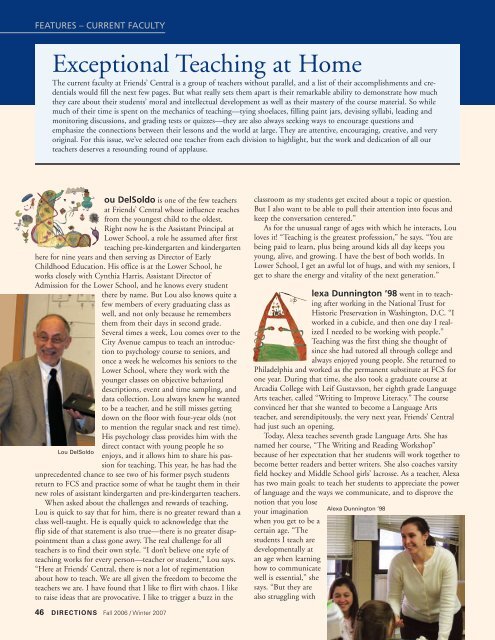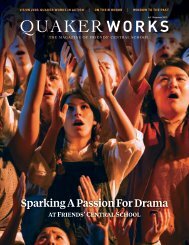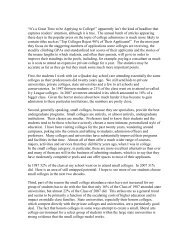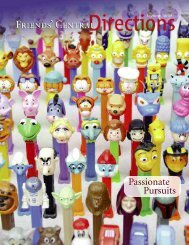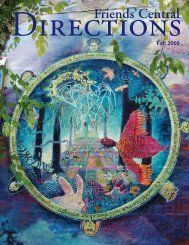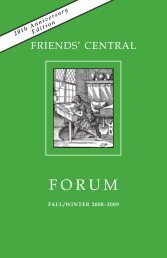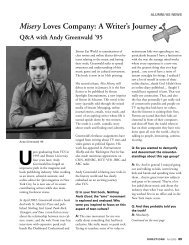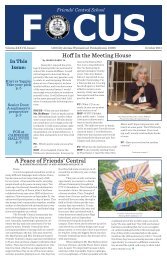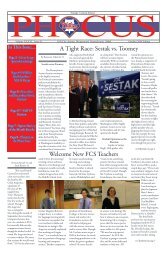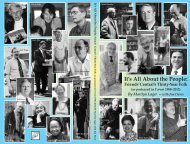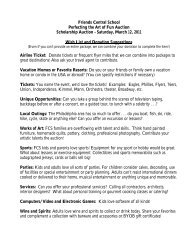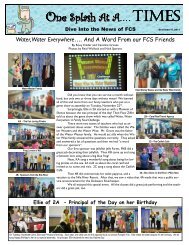2006-2007 Fall/Winter Directions - Friends' Central School
2006-2007 Fall/Winter Directions - Friends' Central School
2006-2007 Fall/Winter Directions - Friends' Central School
Create successful ePaper yourself
Turn your PDF publications into a flip-book with our unique Google optimized e-Paper software.
FEATURES – CURRENT FACULTY<br />
Exceptional Teaching at Home<br />
The current faculty at Friends’ <strong>Central</strong> is a group of teachers without parallel, and a list of their accomplishments and credentials<br />
would fill the next few pages. But what really sets them apart is their remarkable ability to demonstrate how much<br />
they care about their students’ moral and intellectual development as well as their mastery of the course material. So while<br />
much of their time is spent on the mechanics of teaching—tying shoelaces, filling paint jars, devising syllabi, leading and<br />
monitoring discussions, and grading tests or quizzes—they are also always seeking ways to encourage questions and<br />
emphasize the connections between their lessons and the world at large. They are attentive, encouraging, creative, and very<br />
original. For this issue, we’ve selected one teacher from each division to highlight, but the work and dedication of all our<br />
teachers deserves a resounding round of applause.<br />
ou DelSoldo is one of the few teachers<br />
at Friends’ <strong>Central</strong> whose influence reaches<br />
from the youngest child to the oldest.<br />
Right now he is the Assistant Principal at<br />
Lower <strong>School</strong>, a role he assumed after first<br />
teaching pre-kindergarten and kindergarten<br />
here for nine years and then serving as Director of Early<br />
Childhood Education. His office is at the Lower <strong>School</strong>, he<br />
works closely with Cynthia Harris, Assistant Director of<br />
Admission for the Lower <strong>School</strong>, and he knows every student<br />
there by name. But Lou also knows quite a<br />
few members of every graduating class as<br />
well, and not only because he remembers<br />
them from their days in second grade.<br />
Several times a week, Lou comes over to the<br />
City Avenue campus to teach an introduction<br />
to psychology course to seniors, and<br />
once a week he welcomes his seniors to the<br />
Lower <strong>School</strong>, where they work with the<br />
younger classes on objective behavioral<br />
descriptions, event and time sampling, and<br />
data collection. Lou always knew he wanted<br />
to be a teacher, and he still misses getting<br />
down on the floor with four-year olds (not<br />
to mention the regular snack and rest time).<br />
His psychology class provides him with the<br />
Lou DelSoldo<br />
direct contact with young people he so<br />
enjoys, and it allows him to share his passion<br />
for teaching. This year, he has had the<br />
unprecedented chance to see two of his former psych students<br />
return to FCS and practice some of what he taught them in their<br />
new roles of assistant kindergarten and pre-kindergarten teachers.<br />
When asked about the challenges and rewards of teaching,<br />
Lou is quick to say that for him, there is no greater reward than a<br />
class well-taught. He is equally quick to acknowledge that the<br />
flip side of that statement is also true—there is no greater disappointment<br />
than a class gone awry. The real challenge for all<br />
teachers is to find their own style. “I don’t believe one style of<br />
teaching works for every person—teacher or student,” Lou says.<br />
“Here at Friends’ <strong>Central</strong>, there is not a lot of regimentation<br />
about how to teach. We are all given the freedom to become the<br />
teachers we are. I have found that I like to flirt with chaos. I like<br />
to raise ideas that are provocative. I like to trigger a buzz in the<br />
46 DIRECTIONS <strong>Fall</strong> <strong>2006</strong> / <strong>Winter</strong> <strong>2007</strong><br />
classroom as my students get excited about a topic or question.<br />
But I also want to be able to pull their attention into focus and<br />
keep the conversation centered.”<br />
As for the unusual range of ages with which he interacts, Lou<br />
loves it! “Teaching is the greatest professsion,” he says. “You are<br />
being paid to learn, plus being around kids all day keeps you<br />
young, alive, and growing. I have the best of both worlds. In<br />
Lower <strong>School</strong>, I get an awful lot of hugs, and with my seniors, I<br />
get to share the energy and vitality of the next generation.”<br />
lexa Dunnington ’98 went in to teaching<br />
after working in the National Trust for<br />
Historic Preservation in Washington, D.C. “I<br />
worked in a cubicle, and then one day I realized<br />
I needed to be working with people.”<br />
Teaching was the first thing she thought of<br />
since she had tutored all through college and<br />
always enjoyed young people. She returned to<br />
Philadelphia and worked as the permanent substitute at FCS for<br />
one year. During that time, she also took a graduate course at<br />
Arcadia College with Leif Gustavson, her eighth grade Language<br />
Arts teacher, called “Writing to Improve Literacy.” The course<br />
convinced her that she wanted to become a Language Arts<br />
teacher, and serendipitously, the very next year, Friends’ <strong>Central</strong><br />
had just such an opening.<br />
Today, Alexa teaches seventh grade Language Arts. She has<br />
named her course, “The Writing and Reading Workshop”<br />
because of her expectation that her students will work together to<br />
become better readers and better writers. She also coaches varsity<br />
field hockey and Middle <strong>School</strong> girls’ lacrosse. As a teacher, Alexa<br />
has two main goals: to teach her students to appreciate the power<br />
of language and the ways we communicate, and to disprove the<br />
notion that you lose<br />
Alexa Dunnington ’98<br />
your imagination<br />
when you get to be a<br />
certain age. “The<br />
students I teach are<br />
developmentally at<br />
an age when learning<br />
how to communicate<br />
well is essential,” she<br />
says. “But they are<br />
also struggling with


